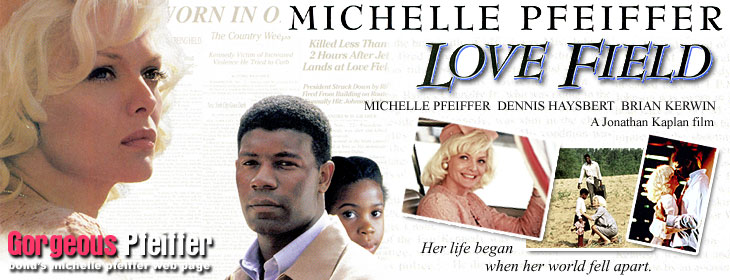 INTERRACIAL
LOVE stories tend to leave a sanctimonious aftertaste:
The very act of presenting a mixed love affair as "courageous"
and "spcial" is, in fact, a regressive, conservation
one. Even as we nod in righteousness at what we're seeing,
we're being made acutely aware of race, of color. The
taboo hasn't really been broken -- it's just that now
we're meant to congratulate ourselves for having the temerity
to see beyond it. INTERRACIAL
LOVE stories tend to leave a sanctimonious aftertaste:
The very act of presenting a mixed love affair as "courageous"
and "spcial" is, in fact, a regressive, conservation
one. Even as we nod in righteousness at what we're seeing,
we're being made acutely aware of race, of color. The
taboo hasn't really been broken -- it's just that now
we're meant to congratulate ourselves for having the temerity
to see beyond it.
The
audience is never allowed to forget the racial identity
of the protagonists in Jonathan Kaplan's Love Field,
which may be a reason this early-60's fable sticks in
the craw --it's like one of those soggy-liberal, story-of-a-perfect-black-man
vehicles they used to fashion for Sidney Poitier. Set
in the week following the JFK assassination, the movie
follows Lurene Hallett (Michelle Pfeiffer), a chattery
Southern belle, as she acts out her devoton to the late
President by hopping a Greyhound in her native Dallas
and heading for his funeral. Her journey is presented
as an act of proto-feminist defiance against her domineering,
white-trash husband (Brian Kerwin). On the bus, she meets
Paul Cater (Dennis Haysbert), who is soft-spoken, kindly,
and black. we're meant to register his straight-ahead
gaze and thoughtful, sonorous voice and perceive his Inner
Goodness.
Paul
has a young daughter in tow, and it soon becomes apparent
that he's involved in some sort of mysterious kidnapping
scheme. When the bus crashes, he and Lurene are thrown
together in a cross-country odysseythat encompasses issue
of trust, survival, and, finally, love. Lurene is drawn
to Paul out of maternal concern for his little girl; then
she learns of his predicament, and her feelings blossom.
As for Paul, he is put in the tricky position of traveling
with a beauitful white woman, which he knows may be suicide.
Love
Field is earnest, compassionate, smoothly directed,
and something of a crock. Despite its humanist veneer,
the movie, at heart, is a soft-pedaled thriller, with
too many garish twists and turns. And Lurene and Paul
are simply too brave, soulful, and well meaning to be
believed: The scene in which their friendship climaxes
with a steamy kiss might be more convincing if it didn't
feel like the meeting of two saints. The best
reason to see the movie is Pfeiffer, who gives a finely
modulated performance, showing us the delicate tug-of-was
between Lurene's rigid homespun values and her better
nature. Yet those values are defeated a little
too easily; by the end, even the layered emotionalism
of Pfeiffer's work is blanked by the film's need to see
her as a role model. Love Field is designed to
give audiences an easy way to feel good about themselves.
It sprinkles its character's very ordinariness with liberal
fairy dust. C+ |
One
that slipped through the distribution net after its production
company Orion's collapse three years ago, this interracial
period drama has finally surfaced on video, having received
only a limited showing in the US to secure Michelle Pfeiffer
an Oscar nomination in a year when Best Actress were thin
on the ground.
It's november 1963
and Pfeiffer's Lurine Hallett is a Dallas housewife and
hairdresser besotted with the Kennedys -- particularly
Jackie, whose coniffure and chic little suits she slavishly
copies. Grieving for the loss of her baby and recving
little understanding from her dullard husband, the lonely
chatterbox joins the crowd at the airport to greet the
Kennedys on the 22nd and is totally devastated when news
of JFK's assassination flashes across TV screens a few
hours later.
Detemined to attend
the President's funeral in washington D.C., she sets out
on a journey that will transform her life when she attaches
herself to a sympathetic black man on the bus (Haysbert)
and his winsome, silent child jonell (McFadden). through
a series of misunderstandings and unhappy accidents, the
trio find themselves on the run, with the FBI, local cops,
racist rednecks and Lurine's blockhead husband in pursuit.
As the pair slowly
turn to each other in their troubles, this eventually
emerges as a gently played love story, and a moving story
of a woman's liberating journey of self-discovery. Haysbert
is strong, Pfeiffer sweet and touching, though it's not
difficult to see why Denzel Washington withdrew from the
production. Resolutely a woman's vehicle, the script is
soft, the story contrived and unlikely in its developments,
and, ironically perphes, the film as a whole is mot effective
as a metaphor for how well-meeting whites can blunder
around amking a hash of things. |
